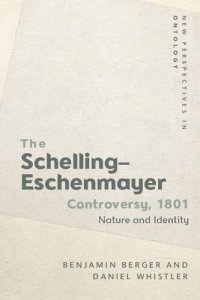
Ebook: The Schelling-Eschenmayer Controversy, 1801: Nature and Identity
Author: Benjamin Berger, Daniel Whistler
- Year: 2022
- Publisher: Edinburgh University Press
- Language: English
- pdf
A study of the genesis of Schelling’s philosophy of nature and absolute idealism, highlighting the importance of A. K. A. Eschenmayer
- The first extended English-language treatment of Eschenmayer’s philosophy, particularly his influential innovations in the philosophy of nature and his doctrine of the potencies
- Includes explanatory notes and a substantial historical Introduction that situates them in context
- Translations include Eschenmayer’s Propositions on the Metaphysics of Nature, his Highest Principle of Philosophy of Nature and Schelling’s On the True Concept of Philosophy of Nature, plus correspondence between Eschenmayer and Schelling from 1799 to 1801
- Comments in detail on key concepts in Schelling’s philosophy and German Idealism more broadly, such as identity, drive, potency, the quantity/quality relation and abstraction
- Considers the transition from Schelling’s early philosophy of nature to his philosophy of identity
During the first decade of the 19th century, F. W. J. Schelling was involved in 3 distinct controversies with one of his most perceptive and provocative critics, A. K. A. Eschenmayer. The first of these controversies took place in 1801 and focused on the philosophy of nature. Now, Berger and Whistler provide a ground-breaking account of this moment in the history of philosophy. They argue that key Schellingian concepts, such as identity, potency and abstraction, were first forged in his early debate with Eschenmayer. Through a series of translations and commentaries, they show that the 1801 controversy is an essential resource for understanding Schelling’s thought, the philosophy of nature and the origins of absolute idealism.
Additionally, Berger and Whistler demonstrate how the Schelling–Eschenmayer controversy raises important issues for the philosophy of nature today, including questions about the relation between identity and difference and the possibility of explaining sensible qualities in terms of quantity. This ultimately leads to the formulation of the most basic methodological question for the philosophy of nature: must this philosophy be based upon a prior consideration of consciousness – as Eschenmayer insists – or might it simply begin with nature itself? By arguing for the latter position, Schelling challenges us to entertain the possibility that the philosophy of nature is first philosophy.